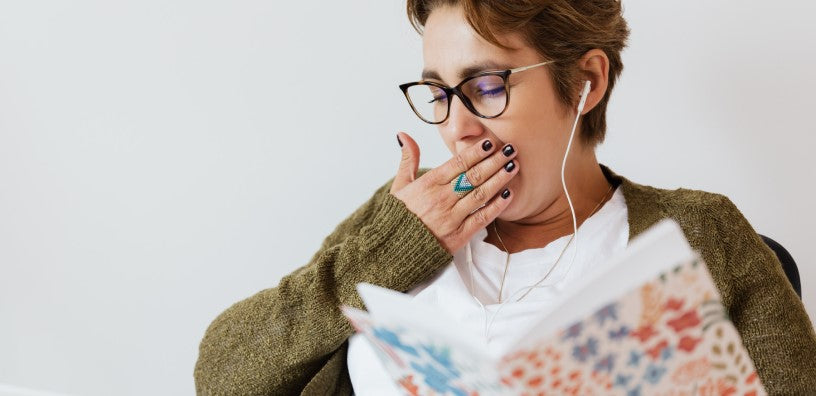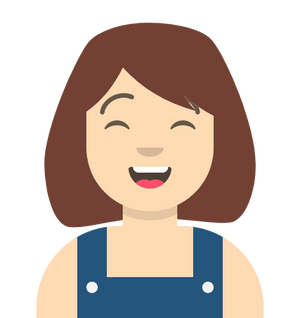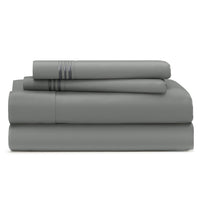
How To Sleep Better: 4 Science-Backed Tips
Studies have shown that about a third of Americans wake up feeling groggy due to a lack of sleep. Normal sleeping habits involve getting about 7 to 9 hours of shut-eye. When you lose sleep, the rest of your day is affected.
Are you feeling muddled and drowsy as you're going on with your day? Keep reading!

What Happens When You Lose Sleep?
Feeling cranky in the morning? You might not be getting enough quality sleep. Your sleepy brain is affecting the rest of your body - memory, productivity, hunger hormones, and your mood are all impacted by a lack of sleep or an irregular sleep schedule.
Maybe you’ve been experiencing some insomnia lately, and you’re wondering what you can do to fix those restless nights.
Not to worry, we’ve researched four science-backed tips for you to help you sleep better.

Cool, Dark, & Calm
Experts say a cool, dark space is best for a good snooze. How can you make your room a cozy sleep oasis?
- Turn that thermostat down. Between 68 to 70 degrees is ideal. It won’t be too humid or dry, and not too cold. Just right. What temperature makes you the coziest in this range?
- Dim the lights. Use some shades, curtains, or blinds to darken your room. Grab a sleep mask. Create some ambiance with a candle or a darkened lamp. Indirect, soft lighting will help maintain your body’s natural circadian rhythms.
- Try neutral colors. Vibrant, bright colors can be overstimulating and affect your mood. To create a calming space, we recommend our white, gray, and/or blue sheet sets.

Declutter, Declutter, Declutter
Studies done in 2015 have suggested that clutter can hinder the quality of your sleep. Chaotic atmospheres result in stressful headspaces. What to do?
- Organize your space. This can look like making your bed, putting those books away, or picking up your dirty laundry off the floor. You’ll be able to focus on your comfy, luxurious bedding rather than a space of disorder and tension.
- Clutter can be in your mind, too. Don’t check your work emails. Disconnect from your tech devices so your brain can rest. Create boundaries between work and home life.
- Clutter can also be loud. Try to maintain a space of peace and quiet whether that be complete silence, white noise, or your favorite music. If you need some music suggestions for your pre-sleep ritual, studies have shown that classical music can reduce stress and lower blood pressure. Crank that Beethoven.

Practice Mindfulness
Being mindful and present before bed can actually help you sleep better. Ponder this:
- Do some gentle yoga. About 85% of Americans that do yoga before bed say they feel less stressed. Yoga not only helps you wind down but can boost your mood, too.
- Take a warm bath or shower. Studies have shown this practice can help you destress by relaxing tight muscles and lowering blood pressure. If you’d like to elevate your bath time experience to one of luxury, we recommend our gentle cotton towel bundle.
- Meditate for at least 20 minutes before bed. Mindfulness meditation has been found to not only reduce instances of insomnia but also help regulate a healthy sleep cycle. First, choose a soothing focus such as your breath (slowly inhale and exhale), a short phrase or prayer, a sound (maybe that Beethoven is really hitting the spot), or a positive affirmation. Then, let go and feel your mind and body relax.

Choose The Right Bedding For You
Your bedding and sleep position can either help you sleep or hinder your sleep. It’s important to pick the right bedding that fits your needs. Here are some things to consider:
- Most individuals in the USA sleep on their side. If you’re a side sleeper, a pillow that can provide support for your head and neck would work best. We recommend our luxury bamboo pillow. If you’re one of those rare back sleepers, not to fret - we recommend a pillow that is a bit slimmer to limit tension in your neck, like our alternative collection.
- Bed sheets that help cool your body and maintain healthy thermoregulation are key to quality sleep. You want something breathable and comfortable. We recommend our luxury sheets if you prefer the extra plushy side of things, or our classic cotton sheets if you prefer something a bit more lightweight.
We've gone ahead & enclosed a 10% off coupon below for you to use if you'd like to take the plunge and try out our sheets for yourself! To shop our collection & get 10% OFF Use the code 'BLOG10' at checkout.
If you found this blog post helpful, comment below and let us know how you sleep better at night. The Cosy community would love to hear from you!
Resources:
- Max Hirshkowitz, Kaitlyn Whiton, Steven M. Albert, Cathy Alessi, Oliviero Bruni, Lydia Don Carlos, Nancy Hazen, John Herman, Eliot S. Katz, Leila Kheirandish-Gozal, David N. Neubauer, Anne E. O’Donnell, Maurice Ohayon, John Peever, Robert Rawding, Ramesh C. Sachdeva, Belinda Setters, Michael V. Vitiello, J. Catesby Ware, Paula J. Adams Hillard, National Sleep Foundation’s sleep time duration recommendations: methodology and results summary, Sleep Health, Volume 1, Issue 1, 2015, Pages 40-43, ISSN 2352-7218, https://doi.org/10.1016/j.sleh.2014.12.010.
-
Corliss, Julie. “Mindfulness meditation helps fight insomnia, improves sleep.”
Harvard Health Blog: Harvard Medical School. June 15, 2020. https://www.health.harvard.edu/blog/mindfulness-meditation-helps-fight-insomnia-improves-sleep-201502187726#:~:text=right%20to%20you.-,Dr.,when%20you%20can't%20sleep. - Jason C. Ong, Shauna L. Shapiro, Rachel Manber, Combining Mindfulness Meditation with Cognitive-Behavior Therapy for Insomnia: A Treatment-Development Study, Behavior Therapy, Volume 39, Issue 2, 2008, Pages 171-182, ISSN 0005-7894, https://doi.org/10.1016/j.beth.2007.07.002.
- Cleveland Clinic, “What’s the Best Temperature for Sleep?” Health Essentials. November 16, 2021. https://health.clevelandclinic.org/what-is-the-ideal-sleeping-temperature-for-my-bedroom/.
- Chafin, S., Roy, M., Gerin, W., & Christenfeld, N. (2004). Music can facilitate blood pressure recovery from stress. British journal of health psychology, 9(Pt 3), 393–403. https://doi.org/10.1348/1359107041557020.
- Marylynn Wei, “Yoga for Better Sleep,” Harvard Health Publishing: Harvard Medical School. June 15, 2020. https://www.health.harvard.edu/blog/8753-201512048753.
- McCarthy, M. (2020, March 28). Hot baths may reduce your risk for heart disease, stroke. Healthline. Retrieved from https://www.healthline.com/health-news/hot-baths-reduce-risk-of-heart-disease-stroke.
- Eric Suni, “Light and Sleep,” Sleep Foundation. April 7, 2022. https://www.sleepfoundation.org/bedroom-environment/light-and-sleep.


